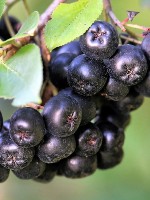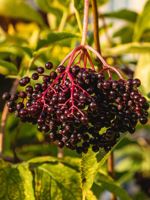Mon-Fri 9am - 5pm Mountain time
Viking Aronia Berry vs Bob Gordon Elderberry
Aronia melanocarpa Viking
Sambucus canadensis Bob Gordon
NOT AVAILABLE THIS SEASON - MIGHT RETURN
Viking Aronia Berry is easy to grow, with black berries that are high in antioxidants. The Viking variety is much more productive than the non cultivar Aronia Berry. The berries can be eaten fresh but are found to be tart and bitter. They are more often used in baking, jams, juices, and wine. They have small, white flowers with a hint of pink that grow evenly on the shrub. The summer foliage turns a very attractive red in the fall.
The Viking Aronia Berry is a self-pollinating plant. Because of its uniformity and high yield, the Viking Aronia Berry is a popular cultivar.
Bob Gordon Elderberry is a Black Elderberry cultivar that produces berries that are larger and sweeter than other varieties, making it one of the top cultivars. It produces large clusters of white flowers that turn into large clusters of dark purple to black berries. The berries are well-suited for baked goods, jams, jellies, and syrups. It was selected from the wild in Missouri.
The large berry clusters that the Bob Gordon Elderberry produces will often end up hanging downward. This makes it more difficult for birds to feed on the berries. If birds are a concern, this might be the right berry for you.
Black Elderberries are considered to be partially self-pollinating. So while they will still produce some berries without cross-pollination, planting with another variety will increase yields. Consider planting with Black Elderberry or Ranch Elderberry.
Warning: the seeds, stems, leaves, roots, and uncooked berries are toxic to humans when eaten in quantity. Berries should be cooked to make them safe for human consumption.
Viking Aronia Berry Quick Facts
Bob Gordon Elderberry Quick Facts
Toxicity: leaves, stems, and uncooked berries are poisonous to humans

